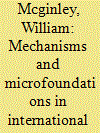| Srl | Item |
| 1 |
ID:
117947


|
|
|
|
|
| Publication |
2013.
|
| Summary/Abstract |
This article takes stock of the current debate on regime complexes. The specific relevance of such complexes for global governance is best grasped if these complexes are understood as systems that relate and organize their elemental institutions. They emerge from activities of relevant international actors, in particular the member states of their elemental institutions, as well as from interactions among these institutions. Regime complexes establish interinstitutional competition, which may lead to open conflict and turf battles, but may also produce a well-established division of labor among the elemental institutions. As they provide forum-shopping opportunities for actors, regime complexes put overlapping governance institutions under continuing competitive pressure and they do not necessarily predominantly benefit the most powerful states. In order to increase the coherence and effectiveness of global governance efforts, the management of regime complexes will become an increasingly important task of global governance.
|
|
|
|
|
|
|
|
|
|
|
|
|
|
|
|
| 2 |
ID:
131711


|
|
|
|
|
| Publication |
2014.
|
| Summary/Abstract |
This article looks at prospects for a mechanism-based research strategy in the study of International Relations. Over the past three decades, the notions of mechanism and microfoundation have taken a central place in discussions of explanation and 'micro-macro' problems in social science. The upshot of much of this discussion has been a call for mechanism-based explanations - explanations of macro-level phenomena in terms of micro-level mechanisms. Some work of this kind can already be found in IR theory, including in systemic research. However, a number of IR theorists, including Kenneth Waltz and Alexander Wendt, have argued that micro-oriented strategies like this will not work, pointing to incongruities between system- and unit-level phenomena. This article argues that these pose less hindrance to a fully-developed model of mechanism-based explanation, and that the field has much to gain from further exploration of this strategy. In particular, mechanism-based explanations could help bring structure back to the centre of discussion in IR theory, and might even give us a way out of the field's own micro-macro problems.
|
|
|
|
|
|
|
|
|
|
|
|
|
|
|
|
| 3 |
ID:
160239


|
|
|
|
|
| Summary/Abstract |
Diversionary conflict theorists assert that leaders can become more popular at home by pursuing conflict abroad. At first glance this claim appears counterintuitive in light of the hardship conflict often imposes on ordinary citizens. Relying on social identity theory (SIT), I deduce two hypotheses to help explain why conflict can increase popular support for leaders. First, conflict with an outgroup can make people identify more strongly with their ingroup. Second, stronger ingroup identification can lead to increased support for leaders inside the group. The second part of the article applies these two hypotheses to Russia's seizure of Crimea in early 2014. Attitude surveys show that the Crimea conflict increased national pride among Russians while support for President Vladimir Putin rose dramatically, and they suggest that the two processes were causally linked. These findings support the article's two hypotheses.
|
|
|
|
|
|
|
|
|
|
|
|
|
|
|
|